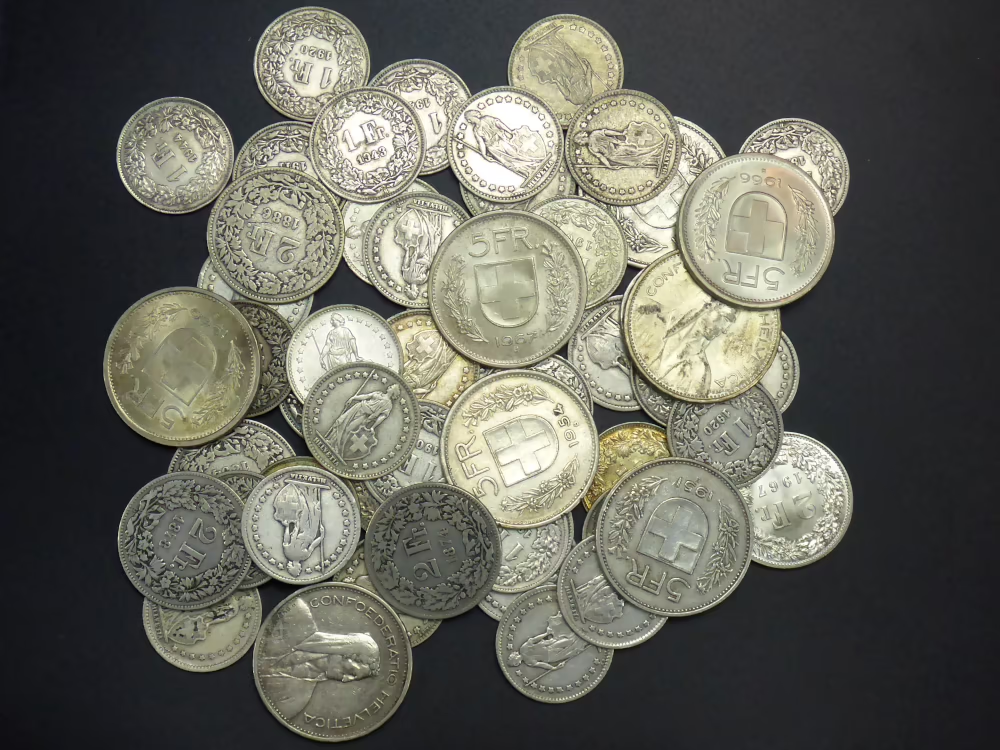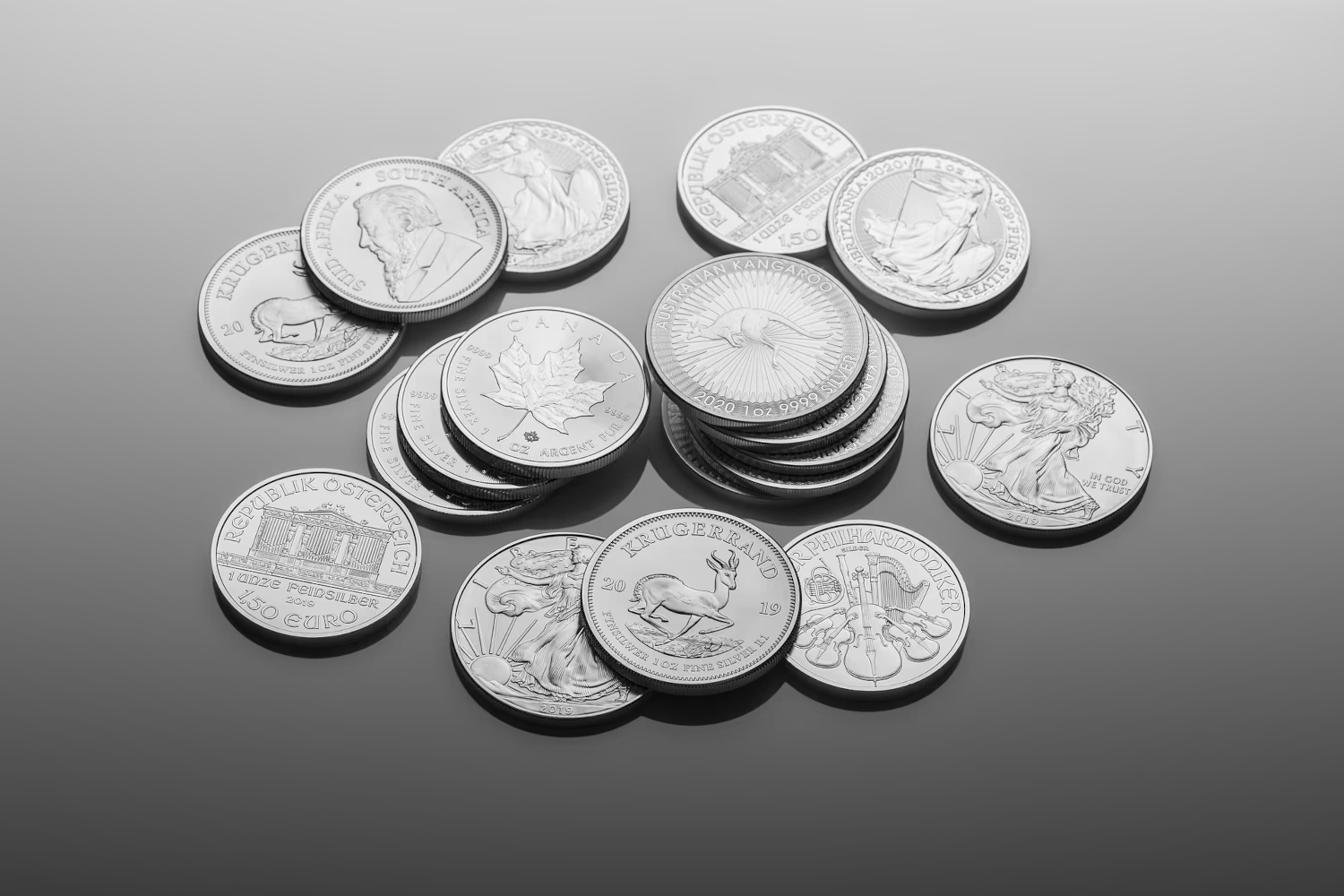Taxes on silver
Summary
-
Silver is subject to VAT, import tax and property tax.
-
Jewellery and articles of daily use made of silver or silver alloys are subject to VAT and import tax, but usually not to wealth tax.
-
Investment silver must be declared in the tax return.
-
Silver in storage can also be sold duty-free on premesec.ch.
Silver, the metal of coinage for thousands of years, now only has the status of an industrial metal and thus a raw material. This can be seen from the fact that the price is very much dependent on economic developments. If there is an economic downturn, the price of silver usually falls as well. This is because 50 percent of the silver produced is consumed by industry and only 25 percent is hoarded by investors in the form of coins or bars.
Since investment plays a minor role in silver, it is taxed at the normal VAT rate like other materials such as copper, wood or cement.
Important note: Disclaimer and riskThis blog post is intended solely for informational purposes and the critical assessment of facts. We would like to help you form your own opinion and better understand the financial markets. This text does not constitute investment advice!
|

Value added tax on silver
Silver bars, silver coins and silver jewellery are subject to VAT, as are almost all goods and services. The federal government has regulated VAT in the Value Added Tax Act and defined it in more detail in the Value Added Tax Ordinance. Only a few goods and services are exempt from VAT, silver is not one of them.
Sell and buy your silver bars and coins on PreMeSec.ch!
In the case of silver coins, it should be noted that the calculation of the VAT is based on the silver value and not on the coin's stamped nominal value, which is usually far below the silver value.
A motion submitted by a St. Gallen politician in 2013, which wanted to exempt all investment precious metals from the tax, was rejected by parliament in 2015. The Federal Council had recommended the motion for rejection on the grounds that the different taxation compared to neighbouring countries could lead to smuggling. In addition, the Federal Council feared that the tax exemption would lead to more investors investing in these raw materials, which would increase the price of silver. Such an increase in the price of raw materials would not be in the interest of Swiss industry.
Import tax on silver
The import tax is the sister of the value added tax and regulates the duties that have to be paid to the state when importing goods. The legal basis is the same. When private individuals import silver, they must declare the silver at the border and pay the import tax.
If the private individual imports goods below the current allowances (as of January 2023: CHF 300), the silver also remains VAT-free. If in doubt, it is advisable to check with Swiss customs before entering the country. If you reclaim the VAT when exporting from the country of origin, you could even buy small quantities of silver tax-free.
Wealth tax on silver
Switzerland has a wealth tax, which is an exception in international comparison; only a few countries in Europe have a wealth tax. It only applies to persons resident in Switzerland; the assets of persons not resident in Switzerland are not taxed. Wealth tax is only levied at the municipal and cantonal level, but not at the federal level. The exemption amounts for wealth tax vary greatly between the cantons due to tax competition. Despite the differences in taxation, however, all assets and thus also precious metals such as silver must be declared in the tax return.
For most taxpayers, the question now arises as to the value at which the precious metals are to be declared. The value on 31 December of the tax year is decisive; the Federal Tax Administration provides the tax values in the price lists. It is recommended to use the advanced search and enter "coins and precious metals" as the title group.
It is also possible to search for the value using the security number.
Table
| Name | Valor number |
|---|---|
| 1 ounce silver | 287 628 |
| 1 kg silver | 274 706 |
| Vienna Philharmonic 1 oz | 1 027 935 |
| Maple Leaf silver CAD 5 1 Oz | 281 057 |
| USA Silver Eagle 1 Oz | 281 052 |
Jewellery within the scope of normal use does not have to be declared for property tax purposes. If in doubt, a specialist or the tax authorities should be contacted.
Buy silver in duty-free warehouses without VAT
There are several duty-free warehouses in Switzerland. These were introduced by the state to reduce the capital costs for import tax and luxury taxes. In this way, importers can store goods in Switzerland tax-free until they find a buyer, so taxes are only due when they leave the bonded warehouse and no capital is needed to pay taxes on products that can only be sold later. After the abolition of luxury taxes, only very high-priced products such as art, carpets and precious metals, as well as alcohol, which is still subject to alcohol tax, are stored in bonded warehouses.

Duty-free warehouses offer the only possibility to acquire silver in larger quantities VAT-free. However, this is only interesting for buyers who do not want to take physical possession of the silver, but only buy it to participate in the price gain. In bonded warehouses, silver can be purchased VAT-free and also held for an unlimited period; after the holding period has expired, the silver is resold to a trader or another private buyer in the bonded warehouse. The only disadvantage is that you have to use the services of a storage company in the bonded warehouse. Some precious metal dealers also offer bonded warehouses themselves. At premesec.ch, you can specify when making an offer whether the silver is stored duty-free or not, so that duty-free stocks can also be resold.
Frequently asked questions about taxes on silver
Do I have to declare my silver coin in the tax return?
-
Yes, you have to declare all your assets in your tax return, including precious metals and therefore also silver coins.
Does silver jewellery have to be declared in the tax return?
-
Yes and no. As a general rule, jewellery that is considered a commodity does not have to be declared individually. If the value of the jewellery exceeds the usual range, it must be declared. In case of doubt, an expert or the tax office should be consulted.
Does silver have to be declared in the tax return?
-
Silver bars and silver coins are part of the assets and must therefore be declared. In case of doubt, you should consult an expert or the tax office.
Do I have to declare silver when importing it into Switzerland?
-
Silver is subject to VAT and must be declared and import tax paid. It should also be noted that in many countries, including the EU, the export of precious metals above a certain value must be declared. Binding information on this can be obtained from Swiss customs or the customs of the exporting country.
Can I also trade duty-free stored silver with PreMeSec?
-
Yes, when making an offer it can be specified whether the silver is stored duty-free or not, so that duty-free stocks can also be resold. A buyer can also filter for duty-free stored precious metals if duty-free stored offers are available.
Does a private individual have to pay VAT when selling silver?
-
As a rule, private individuals do not have to pay VAT, as they are not subject to VAT.
